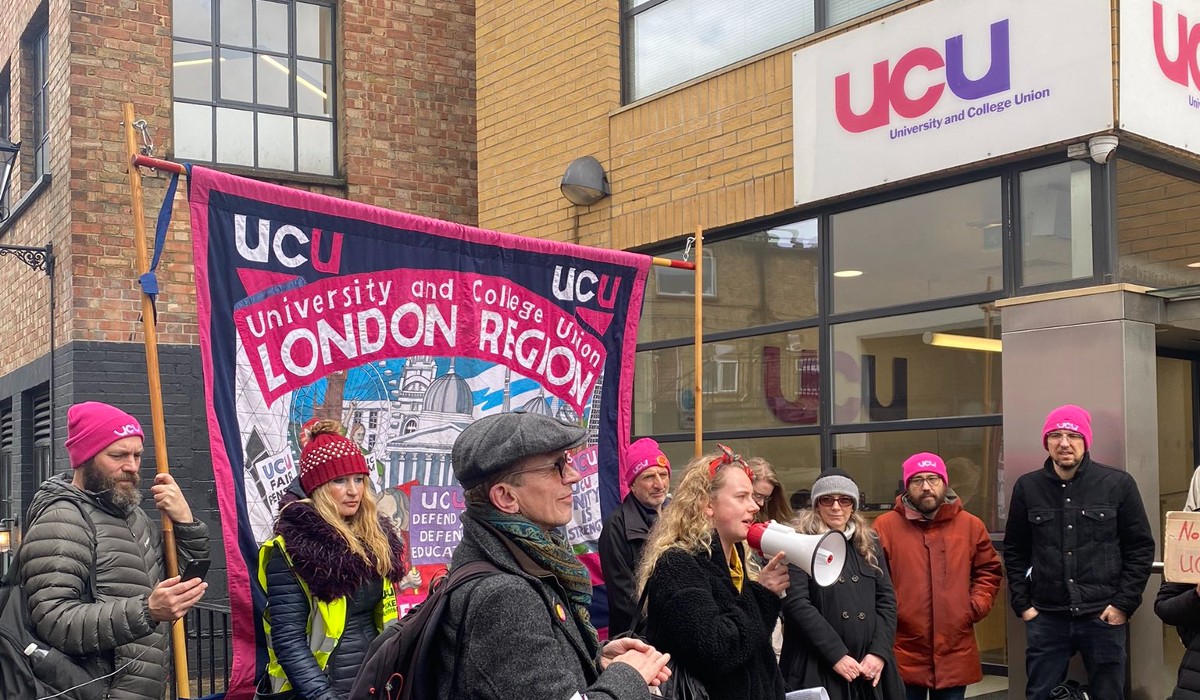 UCU members lobby HEC, Friday. Photo: @GoldsmithsUCU / Twitter
UCU members lobby HEC, Friday. Photo: @GoldsmithsUCU / Twitter
Counterfire’s weekly digest with the latest on strikes and workplace struggles
You can sign up to receive News from the Frontline straight in your inbox
On Wednesday, an estimated 700,000 workers across unions and sectors struck together, hundreds of thousands marched on the streets and London was brought to a standstill. The atmosphere was one of solidarity, unity and militancy. Millions of workers are acutely aware of the attacks we are facing but will have felt a sense of what can be achieved through the mass collective action on display.
By Wednesday evening, the UCU General Secretary announced that the university employers had made a ‘final’ offer which was spun as a victory despite including no movement on pay, and little more than a framework for more talks over pensions and casualisation. On Thursday, the government announced a new deal for health workers – a non-consolidated one-off 6% increase this year and 5% consolidated next year. The RCN, Unison and GMB, immediately said the offer will be put to members and that the leaderships are recommending it is accepted. Unite will also consult it’s members but without recommendation. Read Elly Badcock’s analysis on the deal and why health workers should reject it here.
All of these unions were demanding significantly higher sums – rightly – given a decade of pay cuts and the level inflation is at currently. If the strikes already undertaken and the determination of the members pushed the government back enough to make this offer, why would the union leaderships back down now? Why accept yet another pay cut when you have both the mandate and the willingness of members to keep fighting?
Thankfully, despite the UCU leadership’s efforts to convolute the proposal and ignore the outrage from many UCU members, the union’s Higher Education Committee voted on Friday to not put the shoddy proposal to a vote and to continue with next week’s strike action. As Counterfire UCU members argue, “Branches across the country must take the view that continuing the action has risks, but not taking further action will weaken and endanger our union going forward”.
It’s clear however that union leaderships are trying to settle these disputes as quickly as possible – and all the rhetoric used to galvanise members to vote to strike in the first place is out the window. This situation should make clear the urgent need for independent rank-and-file organising in the unions that can challenge the leaderships when they try to sell out and push to keep fighting for what they really deserve.
Please make sure you book for the 10 June How We Fight, How We Win Rank-and-File Organising Conference, encourage fellow trade unionists to do the same, and pass a motion at your branch to back it.

Radio silence: NUJ joins Walkout Wednesday
National Union of Journalists (NUJ) action on 15 and 16 March saw regional disruption to BBC radio and television services.
Over a thousand NUJ members across the UK walked out in defiance of proposed cuts to local radio service. The members are enacting an 83% mandate with this action.
NUJ’s Michelle Stanistreet says:
“It’s not simply a question about jobs and conditions for our members – they believe passionately in the value that quality local content brings to their audiences, journalism that is trusted and relied upon in the communities they serve.
“The BBC’s raiding of local radio budgets to fund its Digital First strategy is wrongheaded and risks undermining a vital part of our public service broadcasting.”
Media workers are becoming increasingly present in this phase of the strike wave.
AB Agri mills to grind to a halt
AB Agri mills will grind exceedingly slow if the company doesn’t sit down and talk to its staff about a proper pay deal. The company implemented a pay increase in October, of 4.5%, plus an additional 1.5% as a one-off.
The mill staff saw this as an insult, as well as a pay cut, and decided to follow the example of their driver colleagues last year, who organised in defence of their terms and conditions, built the union across 5 sites, and voted overwhelmiingly to strike if the company didn’t talk. The end result was a complete reverse ferret on the attacks on Ts & Cs, and a 12.5% pay rise. The driver reps have been holding regular meetings with the mill ops reps, and are fully supportive of their workmates.
The ballot, which closed last week, delivered an 85% majority for strike action, on a 72% turnout, and the Unite union served notice this week of a 7-day stoppage April1-7, followed by a work to rule and overtime ban for a week, followed by all-out indefinite strike if the company has not budged.
Unite: Hounslow traffic wardens finally get a deal
Parking Enforcement Officers across Hounslow are to get pay rises of 8% backdated to April 2022 (on top of 1.7% already awarded) with a further 7% uplift from April 2023 and a further minimum 2% uplift from October 2023. This should see full-time pay jump from £24,420 to £28,730 by November 2023.
This deal is the end-point to a campaign involving a shift to all-out indefinite striking.
Unite’s Clare Keogh says:
“The workers were not prepared to give up. Their determination has paid off. It’s a shame Serco took so long to reach a deal. This is a lesson to other outsourced employers up and down the country.”
A good deal? Maybe. Serco recently declared profits of £225 million for 2022. Those profits are unpaid wages.
Suckling and Hoyer tanker strike
40+ tanker drivers on the Phillips 66 contract, servicing Jet garages across the country, will walk out on Monday in protest at their employer’s refusal to pay the rate for the job. The drivers work for JW Suckling at the Essex, W. London and Grangemouth depots, and for Hoyer in Stockport, and are paid £5 an hour less than colleagues with different employers servicing the same contracts.
Unite reps say that the two companies have long had a reputation for squeezing drivers “and it’s a delight to see the will to fight back.” They went on to make clear that any attempt to make better-paid drivers pick up the slack will get nowhere. “If Jet garages run out of fuel, they should blame the employers; they needn’t expect us to pick up the dog mess they’ve created”.
Automotive workers up the ante
The 800 workers at Stellantis’ (the car maker formerly known as General Motors) Ellesmere Port plant will start balloting this week on strike action over pay. They overwhelmingly rejected the company’s ‘final offer’ of 8% + £500 lump sum.
The stewards presented the offer to the workforce without a recommendation either to accept or reject. The negotiating team reported that they believed they had got as much as they could through negotiation, and they did not believe the company would increase the offer. The stewards, whist accepting their team’s efforts, looked at the cost of living figures and could not recommend the offer.
The Luton van plant, and Central Stores voted to accept, but Ellesmere Port workers rejected it, and every indicator suggests they are angry enough to fight.
Week-long fightback in North Norfolk
Following on from similar actions in the rest of East Anglia, bin and refuse workers in North Norfolk are spending this week out on strike to get a decent pay deal from outsourcing barons Serco, where they are subcontracted by North Norfolk and Breckland councils. The staff, some of whom continue to be on a minimum wage set long before the present inflationary crisis, have reported to the press that the public is being very positive towards them and passers by are honking their car horns. The employer and the councils are still refusing to talk to Unison negotiators.
Before you go
Counterfire is growing faster than ever before
We need to raise £20,000 as we are having to expand operations. We are moving to a bigger, better central office, upping our print run and distribution, buying a new printer, new computers and employing more staff.

